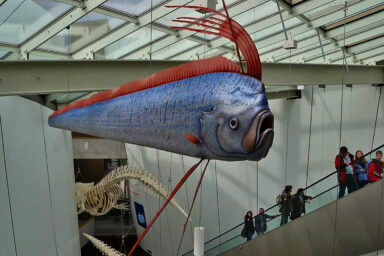Fungal Attacks Threaten Global Food Supply, Researchers Say
|
Listen To This Story
|
PICKS are stories from many sources, selected by our editors or recommended by our readers because they are important, surprising, troubling, enlightening, inspiring, or amusing. They appear on our site and in our daily newsletter. Please send suggested articles, videos, podcasts, etc. to picks@whowhatwhy.org.
Fungal Attacks Threaten Global Food Supply, Researchers Say (Maria)
The author writes, “Fast-rising fungal attacks on the world’s most important crops threaten the planet’s future food supply, scientists have said, warning that failing to tackle fungal pathogens could lead to a ‘global health catastrophe.’ Fungi are already by far the biggest destroyer of crops. They are highly resilient, travel long distances on the wind and can feast on large fields of a single crop. … The impact of fungal disease is expected to worsen, the researchers say, as the climate crisis results in temperatures rising and fungal infections moving steadily polewards.”
Kremlin Drone: Zelenskyy Denies Ukraine Attacked Putin or Moscow (Sean)
The author writes, “Ukraine’s President Volodymyr Zelenskyy has denied his country carried out an alleged drone attack on the Kremlin, which Russia says was an attempt on President Vladimir Putin’s life. ‘We don’t attack Putin or Moscow. We fight on our territory. We are defending our villages and cities,’ he said, speaking on a visit to Finland. The Russian president’s office said defenses downed two drones overnight. It threatened to retaliate when and where it considered necessary.”
Jordan Neely Just Needed Some Help (Dana)
From Defector: “A 30-year-old black man named Jordan Neely died on a New York City subway train on Tuesday. He was upset, yelling, possibly in the midst of a mental health crisis, and then a white man came over and put him in a chokehold and held him in that chokehold for 15 minutes, by the end of which Neely was dead. That’s pretty straightforwardly murder, by any reasonable moral standard if perhaps not by whichever tortured legalistic one will be offered to defend or exonerate the killer — but that’s not really what I’m thinking about today. I’m thinking about how you only get the one life.”
Arkansas Owes a Jewish Man $500 but Won’t Pay Up Because He Refuses to Sign a Pledge to Not Boycott Israel (DonkeyHotey)
From The Arkansas Times: “A Jewish dermatologist from North Carolina with family ties to Israel fell victim to Arkansas’s anti-boycott requirement this year, and now he’s out $500. An expert in getting patients to take their medications and improving patient-physician relationships, Dr. Steve Feldman Zoomed in from Winston-Salem, North Carolina, to meet with Little Rock medical students in February. … Then he got an electronic notification showing that his decision to skip checking the box agreeing to not boycott Israel was going to be a real problem.”
Breaking Far-Right Talk Radio’s Hold Over Rural Wisconsin (Al)
From The Cap Times: “Most of what’s written about media in Wisconsin concerns the status of print newspapers, television news, digital news delivery or the impact of social media and podcasts. Radio? Not so much. But this column is about the dream of two Madison business partners to acquire radio stations that geographically blanket Wisconsin and make each station popular and nonpartisan hometown destinations for local news, discussion and entertainment.”
This Company Adopted AI. Here’s What Happened to Its Human Workers (Gerry)
The author writes, “Last week, [Erik] Brynjolfsson, together with MIT economists Danielle Li and Lindsey R. Raymond, released what is, to the best of our knowledge, the first empirical study of the real-world economic effects of new AI systems. They looked at what happened to a company and its workers after it incorporated a version of ChatGPT, a popular interactive AI chatbot, into workflows. What the economists found offers potentially great news for the economy, at least in one dimension that is crucial to improving our living standards: AI caused a group of workers to become much more productive. … At the same time, however, the study also shines a spotlight on just how powerful AI is, how disruptive it might be, and suggests that this new, astonishing technology could have economic effects that change the shape of income inequality going forward.”
Has the CRISPR Revolution Arrived Yet? (Michaela)
From Yale Insights: “A decade after scientists developed the ability to edit DNA using the CRISPR sequence, the first drugs using the technique are approaching the market, with the potential to transform the lives of people with certain genetic illnesses. But questions of ethics, access, and pricing remain. We talked with Dr. Greg Licholai, a biotech entrepreneur and a lecturer at Yale SOM, about the state of the technology.”
Banana Drama: ‘Hungry’ South Korean Student Eats $120,000 Artwork (Roshni)
The author writes, “A South Korean art student who ate a banana that formed part of a renowned installation by the Italian artist Maurizio Cattelan said he did so because he was ‘hungry.’ Noh Huyn-soo was filmed brazenly removing the banana, which was duct-taped on to a wall at the Leeum Museum of Art in Seoul, unpeeling it and eating it in front of stunned onlookers before reattaching the banana skin to the wall using the same tape and walking off with a satisfied grin.”




